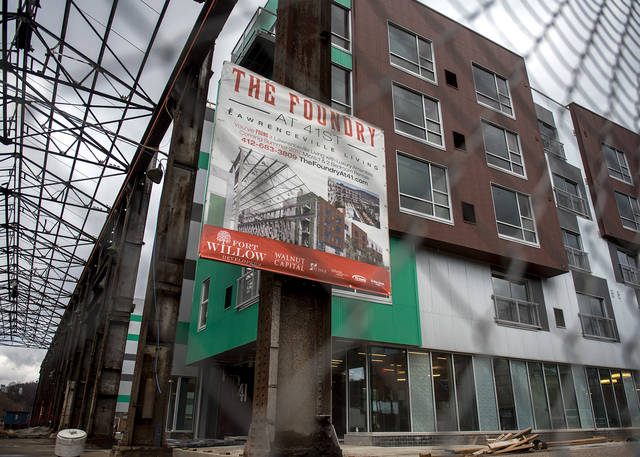Pittsburgh housing advocates won a major victory Wednesday with City Council’s final approval of legislation requiring residential development projects in Lawrenceville featuring 20 or more units to offer affordable housing.
The housing bill creates a zoning overlay district exclusive to Lawrenceville designed to offset the impact of gentrification in the rapidly growing neighborhood.
Under the bill, developers must make 10 percent of any project involving 20 or more units affordable for people earning at least 50 percent of Allegheny County’s area mean income, which is $38,000 for a family of four.
“We’re really hoping to gain units that people who are Lawrenceville residents can actually afford,” said Councilwoman Deb Gross, who sponsored the legislation. “We’ve lost a lot of affordable units. What Lawrenceville has are those big parcels that used to be industrial parcels, and as developers are looking to do large (residential projects) there we may be able to gain back dozens and dozens of affordable units.”
Pittsburgh’s Affordable Housing Task Force has estimated that the city has a shortage of more than 17,000 homes necessary for low-income residents, and city officials have struggled for years to address the problem.
In Lawrenceville, the cost of buying a new house has increased from a median sale price of less than $100,000 in 2010 to about $240,000 in 2017, and houses are now selling for as much as $700,000, according to Dave Breingan, executive director of neighborhood advocacy Lawrenceville United. Studio apartments are renting for $1,200 per month, he said.
Over the past five years, Lawrenceville has lost about 300 Somalian immigrants, 150 residents who owned homes for 30 years or more and many low-income residents, mainly because of soaring housing costs, Breingan said.
“Lawrenceville is experiencing the largest housing boom in decades, but it’s largely in the very high end,” he said. “This is a huge moment. We’re really happy to see (the bill) move forward.”
Council also approved a new cooperation agreement with the Pittsburgh Water and Sewer Authority that clearly defines the relationship between the city and PWSA and outlines their respective responsibilities.
The PWSA agreement maintains the authority as a public agency and requires Pittsburgh to pay water, sewer and fire hydrant charges on a five-year phased-in basis beginning in January 2020. City entities have received free water for decades and most city properties are not metered for water usage. Pittsburgh and PWSA would share the costs of installing water meters on city properties under the agreement.
Other key elements of the agreement require:
- Abolishment of a $7.1 million payment PWSA provides the city each year.
- PWSA to reimburse the city for PWSA employees enrolled in the city pension plan and pay city permit fees.
- PWSA to pay for city services including as fuel for authority vehicles, fleet maintenance and street sweeping costs.
Council unanimously approved both bills. Councilman Corey O’Connor of Swisshelm Park was absent.








